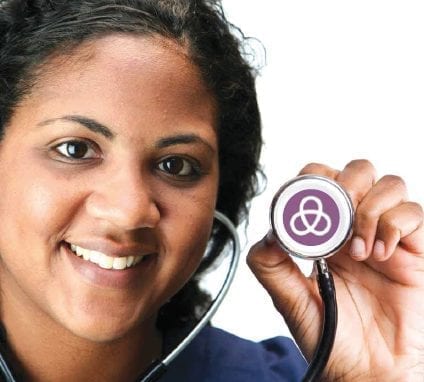By: Pacific College
Published: May 7, 2020
Dr. Carla Mariano, EDD, RN, AHN-BC, FAAIM
Dr. Mariano had been hard at work with her research and writing efforts.
- Mariano, C. (In Press). Holistic nursing: Scope and standards of practice. In M. Helming, K. Avino, D. Shields, & W. Rosa, (Eds). Holistic nursing: A handbook for practice (8th ed.). Burlington, MA; Jones and Bartlett.
- Thornton, L. & Mariano, C. (In Press). Evolving from therapeutic to holistic communication. In M. Helming, K. Avino, D. Shields, & W. Rosa, (Eds). Holistic nursing: A handbook for practice (8th ed.). Burlington, MA; Jones and Bartlett.
- Hart, J. (2019). The expanding field of holistic nursing – A growing trend. Interview with Carla Mariano. Alternative and Complementary Therapies. February, 2019, 25 (1), 53-55.
- Mariano, C. (2019). The case for interdisciplinary collaboration. Oriental Medicine. Spring, 2019, 1,4,7.
- Mariano, C. (2019). Holistic integrative therapies in palliative care. In M. Matzo & D. Sherman (Eds), Palliative care nursing: Quality care to the end of life (5th ed.). NY: Springer Publishing Co.
Dr. Mariano has also been leading weekly meditations for Pacific College students, faculty, and staff during the COVID 19 crisis. Meditation has created a space for people to gather, heal, and be present as a community.
Sondra A. Rivera, RN, MSN-Ed
A Nurse, Just Behind the Frontline…
I am a nurse. A professional registered nurse. I do not always practice at the bedside, I do not always have patients or clients, and I do not practice in a doctor’s office or a medical facility, but I am a real nurse, a professional registered nurse. I am a teacher, an instructor, and a facilitator of knowledge. I do not teach in a classroom or lecture hall or stand in front of a podium, but I am a nurse educator.
In this worldwide pandemic, I find myself feeling both honored and proud of my fellow nurses, especially the brave selfless heroes on the frontlines, even more so toward my former students who are now the nurses on those frontlines.
Yet, I am also feeling terribly guilty that I am not working alongside my fellow frontline nurses. I have years of experience and my heart is always at the bedside, especially with patients on the ventilator. Nevertheless, for my own health reasons, I have made the conscious choice not to be on the frontlines.
It is a personal dilemma that I struggled with until last week when another nurse educator told me not to feel guilty because I am educating and preparing nurses to be on the frontlines. Now, to be honest, it took a few more days to sink in. In fact, it was not until a recent graduate called me to check in and tell me about her experience in the emergency room and to tell me just how she feels about me and faculty that prepared her for this battle.
It was then that I realized I am caring for my patients, clients, family, friends, and my students but not just because I am a professional registered nurse and a nurse educator, but because I am ever present for them in their time of need.
As a nurse I am calling to check in on my patients and clients (and fellow parishioners) from my position as a faith-based health coordinator in the communities of Red Hook, Carroll Gardens, Cobble Hill and Bay Ridge. They leave me messages and send me emails with jokes, prayers, intentions, and just a word or two to connect.
As a nurse educator I have the reputation of having my cell phone on until 9pm. That reputation has been put to the test as I am getting text messages, calls, and emails at all hours of the day and night. My students, who are on the frontlines, know I am there for them because I told them to reach out to me, and I will be there. I am always present. Most often I just listen as they vent, share, cry, pray, and even scream. There are times that we just sit quietly and be still and focus on breathing and feeling.
I am Mama, G’ma, and a wife who is now home to cook, clean, and bake more than ever. At home I am a nurse, and now I am the science and art teacher for the 3- and 5-year boys! And I love it! For my family and friends, I am ever present by phone and FaceTime socials! And drive-by visits with 15+ feet of physical distance with air hugs! Daily, I run several prayer chains and intention runs for my friends, family, patients, parish, and coworkers.
I am a nurse just behind the frontlines, so others can be there! I am here!
Caroline E. Ortiz, MSN, MPH, RN, NC-BC
Caroline has been busy with her doctoral studies and is focusing on presenting around traditional wisdom and healing.
- Nursing Mutual Aid 2020 – “Traditional Wisdom for Healing Trauma,” Twitter Conference @NrsgMutualAid #NMA2020
- Accepted for Presentation: National Association of Hispanic Nurses – 2020 Annual Conference
“Susto, Empacho, and the Wisdom of Our Abuelitos,” Miami, FL - Accepted for Presentation: Eastern Nursing Research Society – 32nd Annual Scientific Sessions, 2020,
“Clinical Meditation and Imagery for Self-Management of Pain Post Spinal Cord Injury,” Boston, MA - Accepted for Presentation: American Holistic Nurses Association – Annual Conference 2020, “Curanderismo: Traditional Healing Practices in a Diversifying America,” Albuquerque, NM
